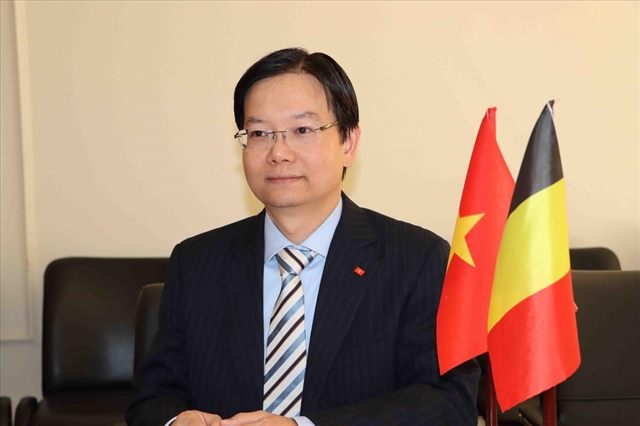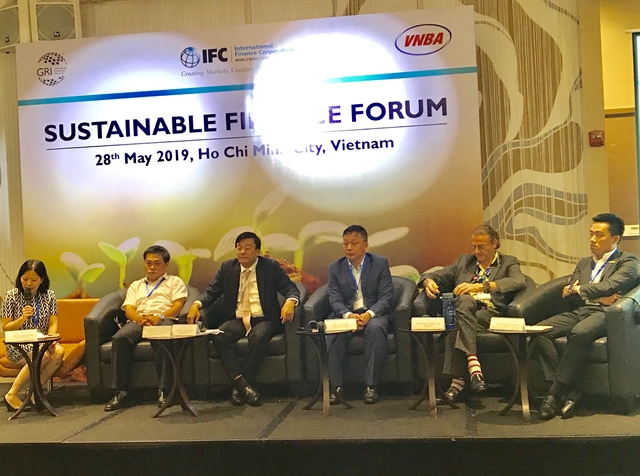 Economy
Economy

Given Việt Nam’s investment deficit in sustainable development projects, there is a growing need for innovative solutions that open up opportunities for private investment in sustainable development projects, banking experts said yesterday at the Sustainable Finance Forum in HCM City.

|
| Speakers at the Sustainable Finance Forum held yesterday in HCM City. VNS Photo Bồ Xuân Hiệp |
HCM CITY — Given Việt Nam’s investment deficit in sustainable development projects, there is a growing need for innovative solutions that open up opportunities for private investment in sustainable development projects, banking experts said yesterday at the Sustainable Finance Forum in HCM City.
A need exists for private investment in economically and environmentally sustainable development projects, which would deliver jobs and inclusive growth, they said.
Nguyễn Toàn Thắng, general secretary of Việt Nam Banks Association (VNBA), said: “While banks have a major role to play in helping unlock opportunities to link investment to sustainable projects in Việt Nam, credit institutions have significant scope to adopt international sustainability practices to better manage environmental, social and corporate governance risks within their portfolios and develop customised financial products for this market.”
The forum focused on green growth strategies and Việt Nam’s progress in attracting climate finance, given the scale of the climate challenge facing the country.
According to a recent International Finance Corporation (IFC) assessment, by 2030 the climate-smart business investment potential in Việt Nam could reach an estimated US$753 billion, with $571 billion of that meeting the country’s needs for low-carbon transportation infrastructure.
Potential investment in renewable energy amounts to $59 billion, with over half of this ($31 billion) in solar power and another $19 billion for small hydropower projects, while new green buildings represent an almost $80 billion investment opportunity.
Roberto de Ocampo, board member with the Global Reporting Initiative and chairman of the Philippines Veterans Bank, told Việt Nam News sustainability reporting had emerged as an essential tool to enable financial flows into developing countries such as Việt Nam, as it would help businesses demonstrate their commitment to sustainable development and include it in core business strategies.
While Việt Nam must increase the effectiveness of climate finance and diversify funding sources, the lack of effective domestic funding for targeted investments has inhibited the leveraging of external funds.
As such, experts said policies should permit access to green growth finance from private investors.
Kyle Kelhofer, IFC Country manager for Việt Nam, Cambodia and Lao PDR, said: “We are working with both regulators and financial institutions to help create a market for climate business in Việt Nam and across the East Asia region through a combination of innovative investment and advisory products.”
SDG agenda
It is estimated that it will cost around $90 trillion to finance the Sustainable Development Goals (SDGs). While the contribution of civil society and the public sector are vital in achieving the SDGs, the private sector’s role is also critical as it can help mobilise much-needed capital to finance the SDG agenda.
In Southeast Asia, the private sector in recent years has taken big strides addressing the impact of companies on the environment and society. However, the banking industry is lagging in its efforts, according to a report from World Wide Fund for Nature (WWF) and the National University of Singapore in October 2017.
According to the report, “Sustainable Banking in ASEAN: Addressing ASEAN’s Flaws”, most of the 34 surveyed banks recognised that businesses to which the banks lend money might harm the environment and society, but none of them disclosed how they managed sustainability risks at the portfolio level.
ASEAN banks apply corporate governance and sustainability reporting as an exercise in good housekeeping, but not as a strategic effort to inform responsible lending.
For example, these banks continue to fund planned coal-fired power stations in the region.
The study also found that among Southeast Asian countries, Singapore is ahead of its neighbors in sustainable financing, while Vietnamese banks have the most work to do.
The EU has already formulated an EU action plan on Sustainable Finance and the forum could also be an opportunity to develop an ASEAN action plan for sustainable finance, or at least begin a discussion for such a plan.
Challenges to growth
Việt Nam faces a number of challenges affecting its sustainable growth. It is highly vulnerable to climate change and natural disasters, while natural assets are being exploited unsustainably.
Weak institutions, often with overlapping mandates and responsibilities, and inadequate processes for coordination, impede state effectiveness, according to a World Bank report.
In the banking sector, vulnerabilities and rising fiscal pressure exist, while the domestic private sector is developing below potential and labour productivity growth is diminishing.
Needed investments in infrastructure exceed available resources in the country, and the ability to mobilise private sector resources for such investments remains weak. In addition, Việt Nam’s demographic and economic evolution is putting new demands on service delivery and social protection systems, according to the report.
Nearly 100 decision-makers from financial institutions, local and international investors, as well as heads of regulatory bodies and intergovernmental organisations, participated in the forum. It was organised by the Việt Nam Banks Association in partnership with the Global Reporting Initiative and International Finance Corporation. — VNS




